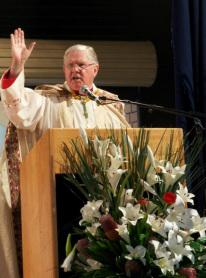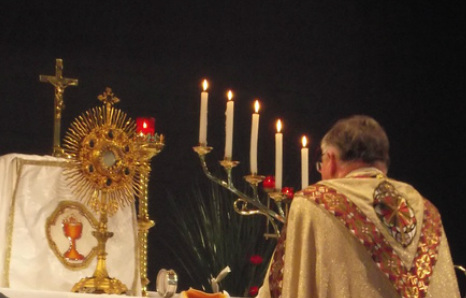Archbishop Coleridge's Homily

This is a religious celebration and there are those who say that religion in any of its forms is merely spiritual. In other words it is not about things of the body, it’s about things of the spirit. And there are some religions that say things of the body are bad, that the flesh is bad, and there have even been Christians down through the centuries who have said just that, “the world of flesh is evil and must be rejected”. We must flee from it, that the body is bad. They must be shuffled off if we are to find the freedom of spirit. Christians who have said that kind of thing, in fact are what we call heretics and I hope there are none of them here this afternoon. The fact that you are here to celebrate Corpus Christi, the Body of Christ, says that you and I are no heretics. Christianity in fact is deeply spiritual, but it is only deeply spiritual because it is intensely bodily. It’s a very fleshy religion and this is the way God wants it. Christianity takes the body very seriously and Catholics have always known that and that’s why we come together on this afternoon of Corpus Christi.
Consider the great truth that lies at the fountain head of our faith. God took flesh. There are other religions that find this absolutely incomprehensible, and even scandalous. But we say that the Word was made flesh; God became one of us. God actually took a body, with all the beauty and all the limitations of any human body. And that body that God took in Jesus was ripped apart on the dark mountain of Calvary. The flesh was violated, as the flesh always is in this world, but the flesh was also vindicated in the most extraordinary and magnificent way when Jesus Christ was raised from the dead. And he didn’t rise just as a spirit. When they encountered him, the first disciples; at first they thought that He was a ghost. But Jesus said, “No, come and touch me, Thomas”. And He says, “Give me a piece of fish and I will even eat the piece of fish to show that I am flesh”. The body was different. He could walk through walls and come through locked doors, but they could see Him and hear Him and they could even touch the flesh. The only difference now is that all the scars that the flesh had born, shone like the sun. The flesh was not abandoned or left behind, it was transfigured.
And then in the very early years of Christianity, St Paul came up with one of the most extraordinary descriptions of the church which we are, when he called us “The Body of Christ”. And that is what you are gathered here today, you are Corpus Christi, the Body of Christ. It is not just once upon a time, back there somewhere, lost in the mist of time. This is the Body of Christ. Even with all our imperfection, our wounds, our weakness, our sins, we are the Body of Christ because it is through the flesh of the church that the risen Christ still speaks here and now, not once upon a time.
And at the heart of the mystery which we are as the church, the Body of Christ, there lies the great sacrament, the source and summit of our lives as Christians, as the Body of Christ and we call this the sacrament of the Body and Blood of Christ. This is not just bread and wine, brothers and sisters; this is a bread that becomes the body broken and a wine that becomes the blood poured out. We don’t just roll play the last supper. We don’t just remember what happened once upon a time back there; our remembering. Sometimes we use the Greek word anamnesis: "Do this in memory of Me". This kind of remembering has such power that it makes the crucified and risen Christ present, here in our midst. And that is why Catholics have always spoken and will always speak of the Real Presence of Jesus Christ, crucified and risen. He is not once upon a time, He is here and now or He's nowhere and never. And He is magnificently here! In a way that no human being could have concocted, or even imagined. When He speaks those strange words that the apostles did not expect, “This is My Body”. What did he mean? This is My Blood". What did he mean? We still ask the question, as we immerse ourselves in the mystery of Presence, and a Presence which is power. And it is only at the end of time, when we see God face to face that we will understand the full meaning and magnificence of those strange words of Jesus, “This is My Body. This is My Blood”.
As we gather around the sacrament which is the source and the summit of our life in the church, we inhabit the new logic of Easter. We make our own the new life of the risen Christ. What is that new life? At the heart of that new life there are these words “This is my Body given for you”, and you is the world, the whole of creation. “This is my Body given for you” freely given, to those who can never be worthy. And what is the old life, the old world we leave behind as we come to Jesus? The old world is the world that says “this is your body taken for me”. That’s the violation. This is your body taken for me. It’s the exact opposite of the logic of Heaven; it’s the logic of hell.
As we gather round the Blessed Sacrament on this feast of Corpus Christi, we say goodbye to hell and its logic, and we make our own joyfully, and in faith, the logic of the risen Christ, who is the body broken and the blood poured out, when we say to the world, echoing the voice of Jesus, coming from the heart of the church which is His body, “This is our body given freely for the life of the world”. Amen

